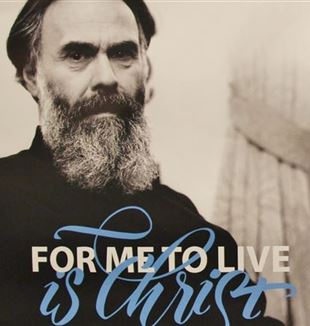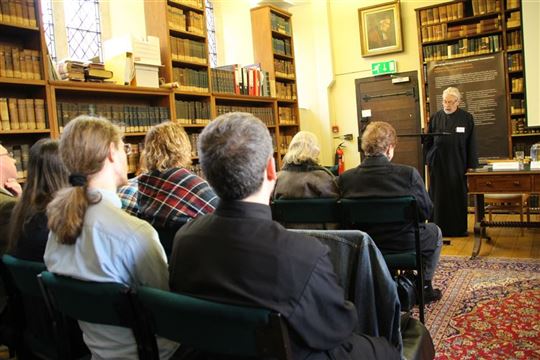
Oxford: The Return of the Metropolitan
A desire taken seriously and a small people moved to indulge it: that’s how the exhibit from the Rimini Meeting brought the Russian bishop back to the place of his mission.After this year’s edition of the London Encounter on November 3, the exhibit on the Metropolitan Antonij of Surož, “For me to live is Christ” (from the 2015 Rimini Meeting) was displayed for a week in Oxford at the House of St. Gregory and St. Macrina, one of England’s ecumenical symbols. Presenting it were several Catholic and Orthodox university students, myself included. Being able to retrace the Metropolitan’s story in the places where he lived and preached was something particularly moving. We all realized that this exhibit has an element of exceptionality: people who see it and who explain it are profoundly touched by it. Anonij would say that the encounter is always joyful because every encounter is from God. Living by the Metropolitan’s side through this exhibit has been a continuous opening of oneself to this dynamic: joy and fulness experienced in the true encounter with another person.
In this circumstance, we encountered a variety of different people. On one hand there was us, the Oxfordians, a group of Catholic and Orthodox friends who meet on Sunday to read the Gospel and share our week’s experiences. Then there were our CL friends from London with whom we thought about the presence of the exhibit at the London Encounter. Finally, the curators of the exhibit, CL Orthodox, came from Russia, Belorussia, and Ukraine.
There was no lack of difficulties. Londoners, who are not acquainted with the figure of the Metropolitan, originally did not really understand what he had to do with an event organized by Catholics. Oxford’s Orthodox Christians, too, did not understand why Catholics would be interested in a person who is very dear and well known to them. Lastly, the curators all seemed like they had just parachuted from God knows where. Yet eventually the exhibit made it to England and all these people who were so different finally met. And it was so wonderful! In the words of one of our volunteers, “It’s like being at a constant celebration of the human.” 
The exhibit served as the heart and the backdrop of various encounters: personalized guided tours among the books of the House of St. Gregory, the soft voice of Avril Pyman, the Metropolitan’s biographer who read us excerpts from her book, the sounds of the verses of Byelorussian poet Dmitrii Strotsev, and a singing night with the London ciellini (I don’t think I’ve ever seen so many bewildered yet happy eyes). Finally, On Saturday, November 10, the exhibit wrapped up with an academic conference on Metropolitan Antonij titled Encounter and the Experience of Freedom—a title which is not to be taken for granted given the recent experiences in the Orthodox Church, but which truly allowed us to engage with the Metropolitan today, and at least ask ourselves what we can inherit from him in twenty-first century Christianity.
Personally, what has stayed with me and has been keeping me most company from this whole adventure, now that in a way it’s all over, is the awareness of how great things can become if we are serious and honest about our own desire. My desire was to invite my Ukrainian, Russian, and Byelorussian friends to England for them to see what I am living. But who could have known that a little people would have moved to satisfy this desire? And who could have imagined that this people, each person who had something to do with this exhibit, would then have grown fond of the human proposal at the origin of the project? Yet all of those who came in to stay even for one minute ended up staying until after dinner to then come back the following day, curious to see what was happening at the House of St. Gregory.
Constanta, Oxford, England